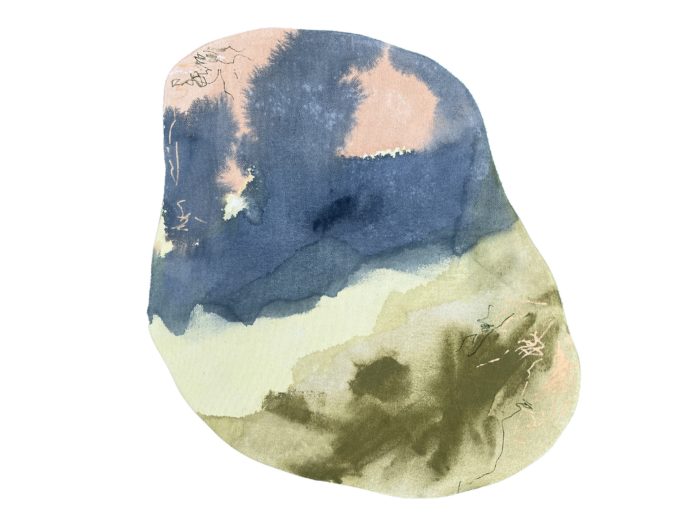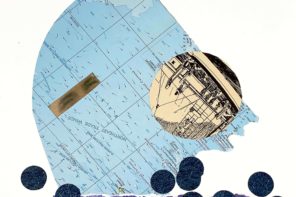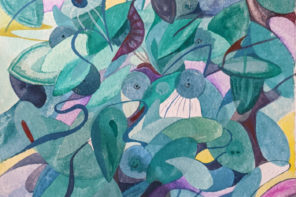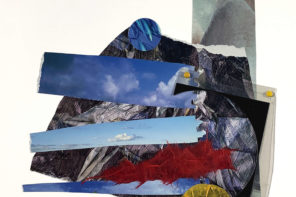Suspended
We sat by the river, watching the black cottonwood seeds float. They hung in the air like snow, like fairies, like a chicken somewhere had gotten run over and popped. My feet were in the water, still cool with spring. C placed his hand on my knee, giving me chills through my jeans. When the geese came flying up, I pretended they were rubber duckies, three babes and a mom skidding to a halt. C twisted the bottle of rosé open with a pop. This was a year before we’d both leave Eugene, two years before we’d reunite in Knoxville.
When I was in Greece, C told me, watching the birds, I worked on a farm pruning olive trees. There was a guard goose, and you had to look it right in the eye when you walked by. If you didn’t, it would come charging at you like this. C raised his arms, stuck his tongue out, and hissed. Amanda was always too scared to look at it. It could tell she was afraid. It’d come charging out of the meadow and chase her.
I laughed and thought of C’s ex-girlfriend. Or girlfriend. I could never tell the status of their relationship, just that he was in love with her and not me.
I’ve always wanted a goose, I said. Which was true, and not just because I was picturing one attacking Amanda. I thought of the pet bird from my childhood. I used to have a lovebird. She liked to bite. We named her Chopper. Choppy for short. She would sit on my shoulder and nibble my ear.
What happened to her? C asked.
My mom killed her, I said. She didn’t mean to. Choppy loved her best. She liked to crawl around Mom’s arm and perch on her forefinger. But Mom had to work and Choppy would get jealous. She got mad locked up in her cage. One day, she bit my mom so hard that my mom flung her. Usually, Choppy would fly a few feet, but we’d just clipped her wings. Choppy hit the lanai floor. Her neck snapped.
Yuck, C said, and took a long sip of wine.
She died in my hands. She was still warm, I said.
I thought of how she’d felt—so light, her velvet feathers flat. The scaly lids of her eyes closed, her claws forever curled. I watched the geese pick at the roots of a bush to our left. It was barely a part of the bank. The spring rains had eroded the soil, a whole foot of it gone since C had shown me the place in February.
Choppy loved wine, I said. She’d always try to butt Mom’s glass with her head. We buried her in the front yard and poured half a bottle over her.
C handed me the rosé and I sipped it. The geese left us. One of the seeds caught in C’s curls, looking like lint. I wanted to pluck it out, but C was busy messing with a joint, trying to get it lit, and besides, I never knew when or if I had the right to touch him. We weren’t clear on things like that.
C changed the subject to tell me about the cottonwood that grew in Colorado, where he and Amanda had met. He didn’t mention that last part, but I knew it, and that he’d probably seen them there with her. The trunks of those trees were more gnarled, he said, older than the ones in Oregon. Around us, the wind rushed. The air grew thick with woolly germs.
C lay back and watched them fall. In the distance, a train honked, and for a moment I felt like we were in a movie. I wished time would slow. The kaleidoscope of the water’s reflection danced on the undersides of the cottonwood’s leaves. C offered me a hit. The breeze stopped, the cottonwood seeds stuck in the air, suspended. I grabbed one, squished it flat in my fist. The breeze resumed, and the seeds fell to the water, rushing away. When C closed his eyes, I poured a long dash of wine into the river. I watched it bubble, disappear into the murky depths.
Compressions
The first time I spent an afternoon bent over, I had a panic attack. This was 19 years before I moved to Knoxville, 17 before I met you. I was eight years old and at Kaimana Beach, looking for shells and away from the girl who had run off with my best friend, Hailey. They were slipping down the algaed lava of the jetty to my right, jumping like ʻaʻama crabs into the broiling water. Ass in the air, face to the sand, I scoured the waves’ residue and found only shattered whorls, topless cowries, and pink drills too small to home the hermits patrolling the shore, smaller even than the moles on my shoulder. Hailey and the other girl swam across the cove to the anchored boats. They kicked to climb. They lay flat on their backs for at least an hour, the sun drying their skin to salt. On the shore, I gathered palmfuls of broken bones, my breath growing shorter and shorter. Soon, I could not breathe or stand. And by the time Hailey and the other girl returned to shore, I was in the backseat of my stepmom’s Escape, on my way to the hospital. You strained your intercostals, the doctor told me. Through the closed door, I heard her tell my stepmom: the spasms were caused by shortness of breath. Does your family have a history of anxiety disorders? Now, two decades later, Hailey and I have lost touch, though I sometimes like her Instagram posts from California—her bleached brows, the ribs that reach like claws from beneath her shirt. I have not been back to Kaimana Beach, or back home to Hawai`i, for nearly three years, have not held a cowry in hand, thumbing its smooth mound, still wet and cool from water. Instead, as my shell collection on Oʻahu gathers dust, as my name grows too small to be held in the mouths of those who loved me as a child, I gather violets. I walk the cemetery across the street from my Tennessee apartment and make plans for the flowers—syrup, garnish, vodka sodas. And after I have filled my pockets with blooms, after I have tired myself with laps through cracking headstones and over long-dead bones, I return home to you. You lead me to bed, and as you enter me, your teeth break the pebbled keloid of my earlobe. Violets crush beneath our weight, the air we breathe is as sharp as the oil bursting from a squeezed peel of lemon. You gasp, and pleasure rolls over me until I drown, my face pressed into our sea of pillows.
Originally from Honolulu, Hawai`i, Mariah Rigg is a Samoan-Haole settler and writer. She holds an MFA from the University of Oregon. Her work has been published or is forthcoming in Oxford American, The Cincinnati Review, Joyland, Catapult, and elsewhere. Next summer, her first creative nonfiction chapbook, All Hat, No Cattle, will be published as part of the Inch series at Bull City Press. Currently, she is a PhD student at the University of Tennessee in Knoxville, a fiction editor at TriQuarterly, and the nonfiction editor at Grist: A Journal of The Literary Arts.




